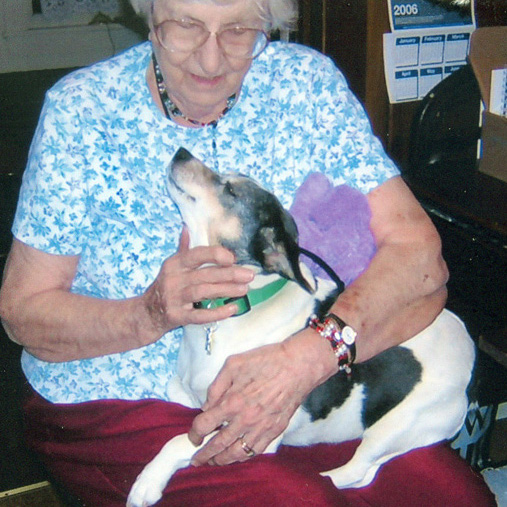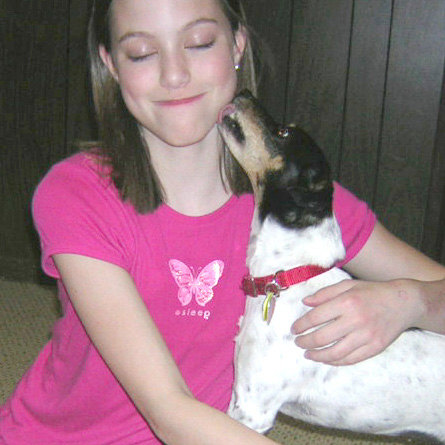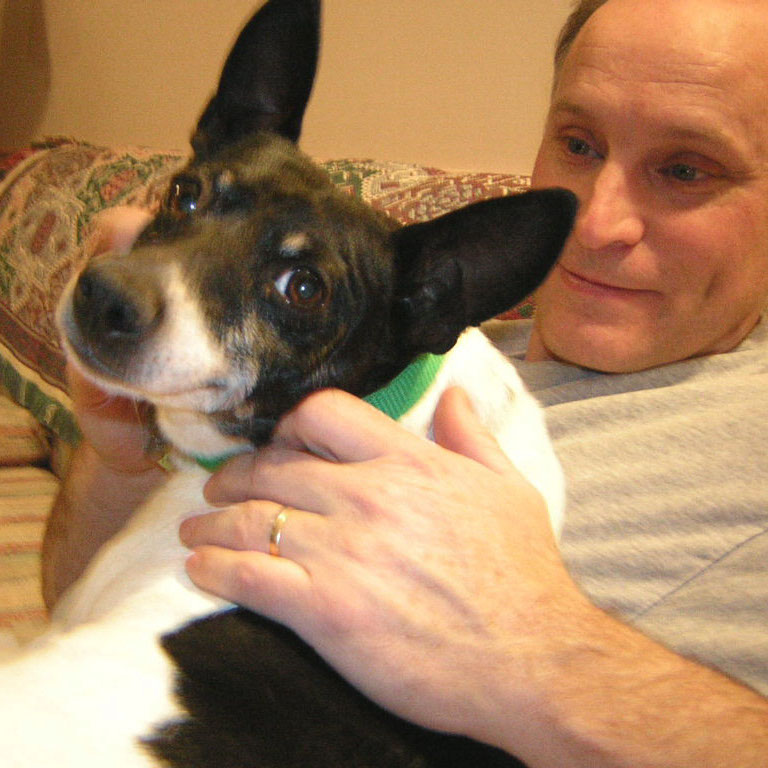Ten Reasons to Adopt a Senior Rat Terrier
A senior dog has an established demeanor and temperament, enabling you to pick the right dog for your needs, lifestyle, and physical property.
Older dogs are generally calmer and less energetic than younger dogs, with lower physical requirements than younger dogs. On walks, they are generally content to go at your pace with less pulling or getting tangled in the leash.
Older dogs are less likely to cause destruction to your home or property. They know that bones are for chewing but shoes, furniture, and remote controls are not.

Most senior dogs have learned how to relax and entertain themselves, and don’t expect you to provide continual stimulation. When bored, a younger dog is more likely to get into mischief while an older dog is more likely to nap.
A senior dog is more likely to have lived with young children in his past and learned to get along with them and also likely to have already learned what it takes to get along with other dogs, making it easier to settle in peacefully.
Many senior dogs already know basic commands such as “sit,” “stay,” “no,” and “come.” Some have learned a lot more in their lives. And since senior dogs tend to be calmer than younger dogs, this can help their concentration when learning new skills.
Senior dogs are happy to greet you when you get home, but they are less likely to jump on you and leave muddy prints on your clothes or run your stockings.
A senior dog rarely finds himself in a shelter or rescue for behavioral or temperament problems. Instead, it’s more likely due to a human problem beyond the dog’s control, such as death of an owner, change in work schedule, or other lifestyle changes.
Providing a loving home for a dog is always a serious commitment, but since Rat Terriers can be expected to live to about 18 years old, choosing a dog already in his golden years doesn’t require as long of a commitment. This is generally more appropriate for older adopters and ones with life-changing medical conditions.
Since older dogs are less likely to be adopted from shelters, they are often the first to be euthanized. Adopting a senior dog truly is saving his life, and you will reap an unparalleled deep emotional reward that will enrich your life every day you spend together.
When Is A Dog A Senior Dog?

There is no firm rule for when a dog becomes a senior because, like people, individual dogs age at different rates. But in general, we call a dog a “senior” when he is in the last one-third to one-quarter of his life, based on life expectancy. For a Rat Terrier, whose life expectancy is about 17-18 years, that would mean that a dog would start getting his senior citizen discount at about age 12-13. If you think in human years, here is how to assess a typical Rat Terrier:
| Rat Terrier Age | Human Equivalent |
|---|---|
| 0-6 months | 0-7 years (baby/young child) |
| 6-12 months | 7-15 years (child) |
| 1-2 years | 15-23 years (adolescent/young adult) |
| 3 years | 28 years (young adult) |
| 4 years | 32 years (adult) |
| 5 years | 36 years (adult) |
| 6 years | 40 years (adult) |
| 7 years | 44 years (adult) |
| 8 years | 48 years (adult) |
| 9 years | 52 years (older adult) |
| 10 years | 56 years (older adult) |
| 11 years | 60 years (older adult) |
| 12 years | 64 years (older adult/senior) |
| 13 years | 68 years (senior) |
| 14 years | 72 years (senior) |
| 15 years | 76 years (senior) |
| 16 years | 80 years (senior) |
| 17 years | 84 years (senior) |
| 18 years | 88 years (senior) |
| 19 years | 92 years (senior) |
| 20 years | 96 years (senior) |
Caring for Your Senior Dog

People are sometimes reluctant to adopt an older dog out of concern that the dog will be sickly or debilitated and will incur large medical expenses. While it’s true that older dogs have an increased risk for conditions such as heart disease or cancer, the older dog’s more mature lifestyle actually makes it less likely to incur accident-related expenses such as bone injuries (from jumping/climbing), intestinal blockages (from eating something it shouldn’t), or puncture wounds (from dog fights). There are no health guarantees for any dog at any age, so finances shouldn’t be a major consideration for age of your adopted dog. All dogs, no matter their age, require regular preventive medical care (annual exams, heartworm testing, vaccinations). To keep an older dog healthy and minimize age-related problems, follow basic and sensible healthcare:
- Good Nutrition – A high-quality food in the appropriate amount can lengthen the dog’s life and prolong good health. Cheaper dog foods are often heavily processed and do not provide the best nutrition; they’re just junk food for dogs. Many high-quality foods are available in formulations just for seniors; they usually contain less protein and are formulated to promote digestion. Kibble for seniors is often smaller, so is easier to chew.
- Regular Exercise – Rat Terriers should be lean dogs, and their fine bone and muscle structure does not support excess weight well. Keeping your dog’s weight down also reduces the chance that the dog will develop diabetes as it ages. Exercise helps keep your dog trim and improves heart and circulatory function. A senior dog may not want to go jogging with you (although some may), but walking is excellent exercise. Even if you have a fenced yard, it’s a good idea to take your senior dog for a walk at least once a day.
- Attention to Dental Care – A little maintenance can help keep your older dog’s teeth and gums healthy, so that you don’t have to spend a lot of money on frequent veterinary cleanings. Feeding high-quality kibble, rather than soft food alone, is a big help. Hard chew toys (NylaBone, Booda Velvets, raw meat bones) improve dental health, too. You can also clean your dog’s teeth regularly, either with a cotton ball or dog toothbrush, to help promote dental health.
- Support for Arthritis – Most people develop arthritis as they age and so do many dogs. Regular exercise helps delay the development of arthritis, as does keeping your dog at a good weight. Gentle exercise for dogs who already have arthritis helps, too; but be sure to demand only as much exercise as the dog can reasonably perform–a walk down the block and back might be all that one dog can do comfortably, while another dog may enjoy a longer stroll. A relatively inexpensive supplement is now available to help relieve arthritis pain and restore joint function. Your vet can help you find the right solution to this common problem.
- Warmth & Comfort – Like older people, most older dogs get cold more easily than younger dogs. Be sure your dog has a soft blanket to curl up in, located away from drafts. Put the dog’s bed in a warm place, like near a heater vent. Use caution about locating your dog’s bed near the clothes dryer; while the dryer provides comfy heat when it is running, the dryer vents to the outside so is actually a source of cold drafts when the dryer is off. In cold weather, a sweater or coat is a good idea for those outdoor walks.
- Soft Bed – Old dogs, like old people, lose muscle mass and fat, which means less cushioning for their bones. Be sure that your older dog has a thick, soft bed or cushion to curl up on.
- Less Frequent Bathing – Bathe your older dog less often than you would a younger dog. Their skin, like ours, gets drier with age, so frequent bathing can cause flaking and itching.
- Soothing Touch – Older dogs love and benefit from gentle massage, which relaxes the muscles and promotes a sense of well-being just because it feels so good and because YOU are touching them. Older dogs may want to curl up next to you or on your lap; your physical presence is a comfort to them.

Ready to consider a Senior? We have senior dogs available for adoption from time to time, so please visit our Senior Rattie Album to browse our adoptable senior dogs and see if you can find one right for you!